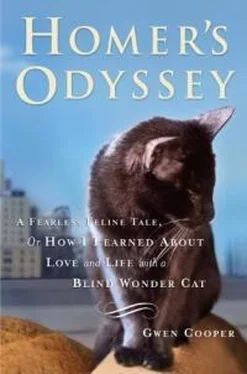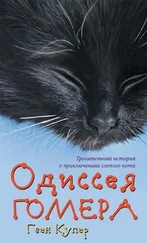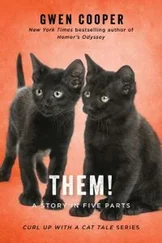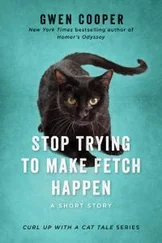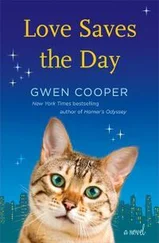I hunkered down on my heels, and Homer happily climbed into my lap, dropping the purloined tampon at my feet. “He’s fine,” I answered. “He doesn’t have any eyes, is all.”
My date appeared staggered by this piece of information. “No eyes?” he asked.
“Well, he was born with eyes,” I explained. “But they had to be removed when he was a kitten.”
THERE ARE SOME ninety million cats residing in roughly thirty-eight million U.S. households, according to Humane Society estimates—and so, in a sense, Homer is entirely typical. He eats, sleeps, bats around crumpled-up balls of paper, and gets into more trouble than I can keep him out of half the time. And, just like any other cat, he has very fixed opinions when it comes to what he likes and what he doesn’t. Happiness, in Homer’s world, is tuna fresh out of the can, climbing anything that can support his weight, pouncing with mock ferocity on his two unsuspecting (and much, much larger) sisters, and napping in the patch of sunlight that falls into the living room just before sunset. Unhappiness is being the last of my cats to score a prime spot next to Mommy on the couch, a litter box that isn’t immaculately clean, permanent denial of access to our apartment’s balcony (blind cat, high ledge—it’s easy math), and the word no .
But Homer looms larger than life in my imagination, and I often think his story can only be thought of in epic terms. He’s the Cat Who Lived—an orphaned, half-starved stray who survived an illness grave enough to take his eyes at two weeks of age, and who nobody wanted to give a home to once it was clear he would pull through. He’s Daredevil, the famed Marvel Comics superhero who lost his sight in an accident while saving a blind man, but who gained superhuman use of all his other senses. Like Daredevil, Homer’s senses of hearing and smell, his ability to map and negotiate all obstacles in an unfamiliar room simply by walking through it once, border on the preternatural. He’s a cat who can smell a single flake of tuna fish from three rooms away, who can spring straight up, five feet into the air, and catch a buzzing fly in midflight. Every leap from a chair back or table-top is taken on faith, a potential leap into the abyss. Every ball chased down a hallway is an act of implicit bravery. Every curtain or countertop climbed, every overture of friendship to a new person, every step forward taken without guidance into the dark void of the world around him is a miracle of courage. He has no guide dog, no cane, no language in which he can be reassured or made to understand the shape and nature of the hurdles he encounters. My other cats can see out of the windows of our home, and so they know the boundaries of the world they inhabit. But Homer’s world is boundless and ultimately unknowable; whatever room he’s in contains all there is to contain, and is therefore infinite. Having only the most glancing of relationships with time and space, he transcends them both.
Homer initially came into my home because nobody else wanted to take him. So it never fails to amaze me how fascinated people are—even people who aren’t particularly interested in cats—when they meet him, or even when they just hear about him. He’s the ultimate conversation starter, something I hadn’t anticipated when I first adopted him. Ninety million cats out there means there are at least ninety million cat stories, but—at the risk of sounding unbearably prejudiced—I’ve yet to encounter a cat as remarkable as mine. At least once a week, every week for the past twelve years, he’s done something that has amused me, infuriated me, or flat-out astonished me—and he’s never more astonishing than when I see him for the first time all over again through somebody else’s eyes.
Oh, how sad! is often the first thing people say when they hear that Homer’s eyes had to be removed at two weeks of age. I usually respond that if you can show me a happier, more rambunctious cat anywhere in the world, I’ll give you a hundred bucks just to get a look at him. How does he get around? they’ll ask. On his legs, I answer, just like any other healthy cat. On occasion, when he’s especially enthusiastic in his play, I’ll hear the bonk! of his little head bumping into a wall or table leg he’d forgotten was there. It’s something that always draws a laugh from me, even while my heart cracks down familiar lines. I laugh because anybody who’s witnessed a cat in a playful frenzy, falling backward off a sofa or charging headfirst at a closed glass door, can’t help but chuckle. And my heart breaks because, in the best of all possible worlds, Homer would have been found a week earlier, when the eye infection he’d had might have been diagnosed as “serious” rather than “incurable.”
Of course, in that world, Homer almost certainly wouldn’t have entered my life in the first place.
MY FAVORITE MOMENT in the celebration of Passover—the holiday commemorating God’s leading Moses and the Israelites out of Egyptian slavery and into the Promised Land—is always the Dayenu, a joyous song sung loudly and accompanied by much clapping of hands and stomping of feet. Hebrew for it would have been enough , the Dayenu recounts the miracles God performed on behalf of the Israelites, insisting after each one that it, all on its own, would have been enough: If He had brought us out from Egypt and not carried out judgments against them, dayenu! If He had carried out judgments against them and not parted the sea for us, dayenu! If He had parted the sea for us and not supplied our needs in the desert for forty years, dayenu!
And so on.
Living with Homer, over the past twelve years, I’ve composed a Dayenu of my own. If Homer had simply managed to live beyond two weeks of age, it would have been enough. If he had simply learned to find his food bowl and his litter box all on his own, it would have been enough. If he had simply taught himself how to get from room to room in our home without any guidance, it would have been enough. If he had simply learned to run, jump, play, and fearlessly do all the things they told me he might never do, it would have been enough. If he had simply made me laugh out loud every single day for over a decade, it would have been enough.
And if he had done nothing more than become one of the most loyal, affectionate, and courageous sources of joy and inspiration I’ve ever known … well, that would have been more than enough.
In a seemingly hopeless situation, when no rational person could expect anything good, yet somehow ends up receiving everything good—these are things we call miracles and wonders. A few of us are lucky enough to see such wonders in our everyday lives.
So this book is for the others like me, but also for the ones who’ve given up on believing in everyday miracles and heroes; for people who love cats and for people who consider themselves firmly anti-cat; for those who think normal and ideal mean the same thing, and for those who know that, sometimes, stepping slightly to the left of what’s normal can enrich your whole life.
To all of you I introduce Homer, the Wondercat.
Dayenu!

1 • Socket to Me
Yesterday made the twentieth day that I have been tossing about upon the sea. The winds and waves have taken me all the way from the Ogyian island, and now fate has flung me upon this coast.
—HOMER, The Odyssey
YEARS AGO, BACK WHEN I STILL HAD ONLY TWO CATS, I WAS FOND OF SAYING that if I ever adopted a third I would name him Meow Tsetung and call him “The Chairman” for short.
Читать дальше
